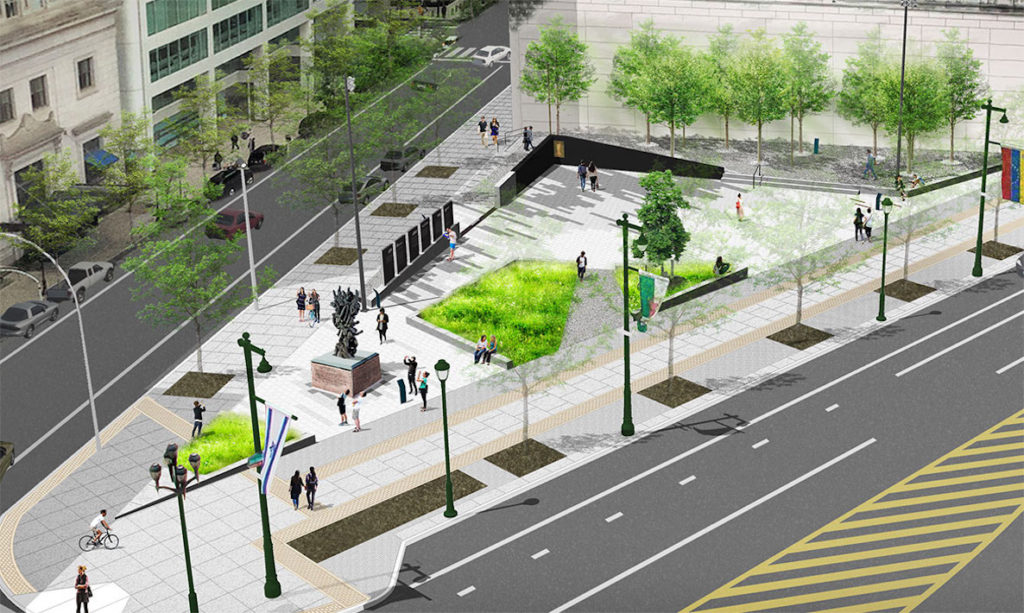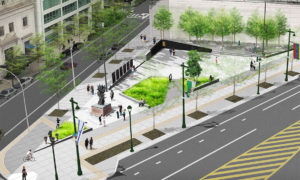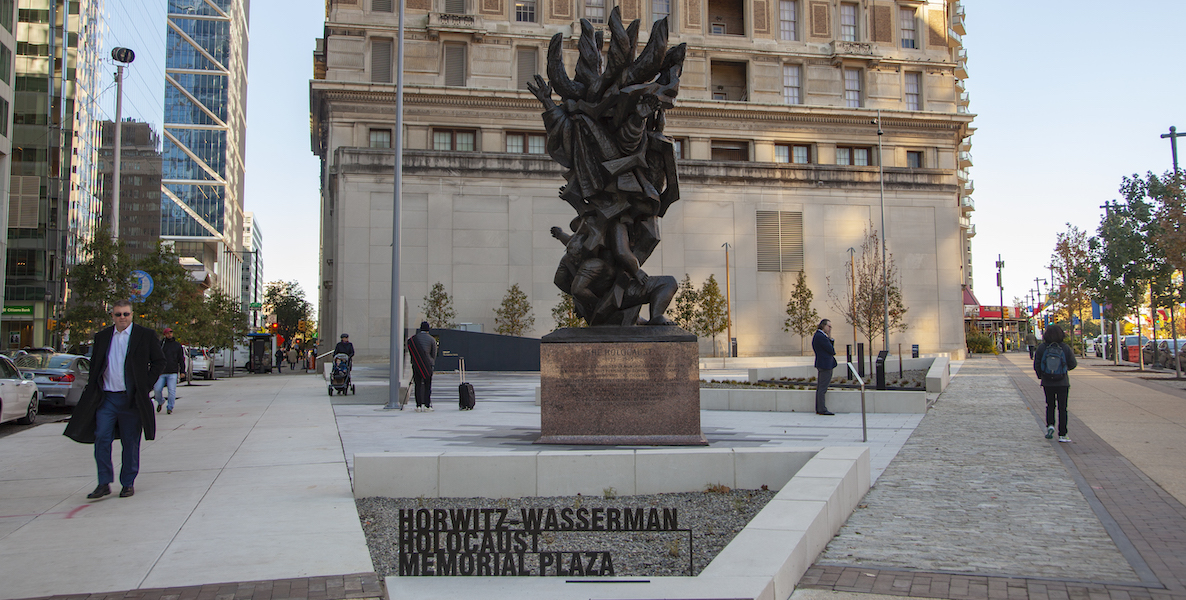The optics couldn’t have been more poignant if someone had staged them.
It was a blue-sky fall Friday at the intersection of 16th and the Ben Franklin Parkway as two young women, each wearing a traditional Muslim hijab, strolled by while chatting. A cluster of young, backpacked, African American school kids sat on the concrete, slurping Wawa drinks and taunting each other. Nearby, two white female tourists snapped photos, while talking in another language.
![]() And just yards away, as if watching over the scene protectively, the Israeli flag blew in the light breeze above a street sign: 1600 W Ben Franklin Pkwy: Avenue of Remembrance.
And just yards away, as if watching over the scene protectively, the Israeli flag blew in the light breeze above a street sign: 1600 W Ben Franklin Pkwy: Avenue of Remembrance.
Knowingly or not, this diverse smattering of souls had entered The Horwitz-Wasserman Holocaust Memorial Plaza, the site which, since last October’s dedication just days before the tragic Pittsburgh synagogue shooting, has become a soulful space for Holocaust education, as well as a literal and figurative intersection that celebrates Philly’s rich diversity.
The intersection first became a place of remembrance and reflection in 1964, when a group of impassioned Holocaust survivors and Jewish civic leaders in Philly commissioned artist Nathan Rappaport, a Holocaust survivor himself, to create and install the first-ever Holocaust memorial in the United States, the hauntingly beautiful bronze sculpture entitled Monument to Six Million Martyrs. Until last year, the corner had been utilized mainly on Holocaust Remembrance Day, Yom HaShoah, each spring.
“The site had not been really optimally used for Holocaust education,” explains Eszter Kutas, Philadelphia Holocaust Remembrance Foundation’s (PHRF) executive director, a Budapest native whose four grandparents are all survivors.
“Anti-Semitism doesn’t happen in a vacuum,” Kutas says. “Its targets are obviously the Jewish population, but it always simultaneously grows with other forms of bigotry and hatred, and we see a drastic increase against other minority groups too.”
Then, starting in the early 2000s, Kutas explains, another group of passionate Philadelphians—many of whom were related to the group who made the 1964 memorial happen—came together, as PHRF, to brainstorm a way to make the space more inviting, more engaging, more meaningful.
They consulted Holocaust experts and scholars, including teams who had worked on Yad Vashem, The World Holocaust Remembrance Center in Israel, and the United States Holocaust Memorial Museum in Washington, D.C.
“The idea was to create a public park that both functions as a regular city park and is open to everybody who wants to be in it, and that also brings in several educational features,” Kutas says.
![]() PHRF’s Board is chaired by Campus Apartments CEO David Adelman, who raised $9.5 million—$2 million of which came from Adelman’s beloved mentor, Campus Apartments founder Alan Horwitz, for whom the Plaza is named in conjunction with Sam Wasserman, Adelman’s grandfather and a survivor as well. (Campus Apartments is also a sponsor of The Citizen.)
PHRF’s Board is chaired by Campus Apartments CEO David Adelman, who raised $9.5 million—$2 million of which came from Adelman’s beloved mentor, Campus Apartments founder Alan Horwitz, for whom the Plaza is named in conjunction with Sam Wasserman, Adelman’s grandfather and a survivor as well. (Campus Apartments is also a sponsor of The Citizen.)
Now, the Plaza features thoughtful—and thought-provoking—features throughout. There are its six pillars, symbolizing the six million Jews who died in the Holocaust; each pillar has austere black front and back panels that juxtapose an aspect of American democracy—say, Freedom of Religion—with an atrocity of the Holocaust, like Kristallnacht, the November 1938 night of pogroms against Jews and their homes, businesses and synagogues in Nazi Germany.
There is the Theresienstadt Tree, which is a tribute to the children of the Theresienstadt Camp in the Czech Republic, who planted, nurtured and created poetic and artistic tributes to a sapling of the same tree, despite recognizing the grim reality that it would invariably outlive them all.
Subtly embedded in the cement in another corner of the Plaza, there are portions of the actual tracks that transported cars full of Jewish people to Treblinka, one of the bloodiest concentration camps of all, in Poland.

These features and more are all amplified by a free app, IWalk, which PHRF created in partnership with USC’s Shoah Foundation, Steven Spielberg’s groundbreaking video archive of survivor stories. Visitors can choose from one of three age-appropriate guided modules to hear and read more about the Plaza’s features while on-site.
“The goal was that you can have a 12-year-old in that space, who goes with a student group and really immerses themselves with a 60- to 70-minute tour. And at the same time, you can have someone from a different country, who is just visiting the Parkway as a cultural tourist destination, walk through the site and interact with it for 10 minutes, and they can still take away very important lessons. Those different levels of interaction make the park unique,” Kutas says.
While content focuses on the Holocaust, the Plaza’s messaging and materials extend well beyond 1945.
“Anti-Semitism and bigotry is on the rise both nationally and internationally. And in this country we’re seeing historic highs of anti-Semitic incidents,” Kutas says.
Between 2015 and 2018, there was a doubling of anti-Semitic incidents: In 2018 alone, there were roughly 1,900 anti-Semitic incidents recorded in the U.S.
“While anti-Semitism has always existed, there is something unique and different about it currently,” Kutas says. “And we need to really bring the entire community’s attention to this matter. Because anti-Semitism doesn’t happen in a vacuum: Its targets are obviously the Jewish population, but it always simultaneously grows with other forms of bigotry and hatred, and we see a drastic increase [of acts] against other minority groups too.”
Between 2015 and 2018, there was a doubling of anti-Semitic incidents: In 2018 alone, there were roughly 1,900 anti-Semitic incidents recorded in the U.S.
Kutas laments that while the Holocaust was a watershed moment in history, it did not put an end to mass genocide. “When we think and learn about the Holocaust, we need to understand that the Jewish population is not the sole population who have gone through such persecution,” she says. “What we can do is take the history and the lessons of the Holocaust and really discuss the larger topics of genocide more broadly.”
Because, she says, the features of these are all the same: They’re all government-led, they all use media to spread hateful messages and propaganda, and they all start as fairly innocuous incidents that ultimately lead to the mass murder, and sometimes extinction, of population groups.
Now, in its mission to bring Holocaust education to as many people as possible—at time when 80 percent of the general public has never been to a Holocaust museum and millennials overwhelmingly think that only two million Jews died—PHRF is this month kicking off a campaign to create an endowment to allow for the upkeep, greening, and security of the site, as well as educational programming like teacher trainings, which PHRF is working on in partnership with Anti-Defamation League (ADL) Philadelphia.
Their endowment goal is $9 million, and they’ve already secured $3 million. They welcome donations of any amount—and encourage people to watch their powerful new video (below), and to visit the website and, of course, the Plaza itself.
On that particular fall morning at the Plaza, listening on the IWalk app to the stories of survivors, you could hear their pain, and their hope. And as you removed your headphones, you could feel that hope, too: In the growing trees. In the chatter of tourists. In the smiles of the young women and the laughter of the students who, more than six decades after the end of the Holocaust, are—for now—living the freedom that so many survivors longed for, and found right here in Philadelphia.
That Philadelphia is the birthplace of American democracy, Kutas says, underlies the concept behind the Plaza’s six pillars. And that legacy, she says, continues. “It’s the legacy of those trailblazers who, in the 1960s, after what they had survived, [still] had the strength and the wherewithal to navigate a really complex negotiation process in the City of Philadelphia to have the first monument in the U.S. be here, and on the Parkway. That’s pretty astonishing—that’s a very Philadelphia story.”
Photo courtesy C. Smyth / Visit Philadelphia



